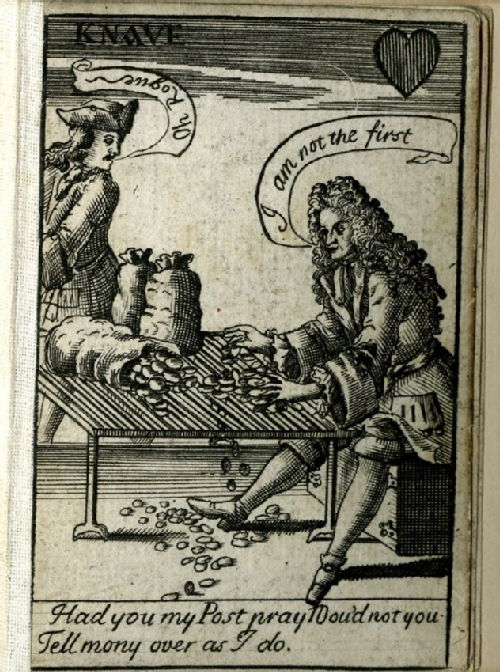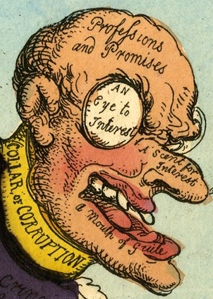All 2 entries tagged State
View all 4 entries tagged State on Warwick Blogs | View entries tagged State at Technorati | There are no images tagged State on this blog
October 01, 2021
Corruption and State Trials
In a chapter just published I examine prosecutions for corruption in the seventeenth and eighteenth centuries. As well as prosecuting political and religious dissent, later Stuart state trials also targeted corrupt ministers who had been the subject of parliamentary investigations and were subsequently impeached for ‘high crimes and misdemeanours’. Indeed, as Lord Mansfield observed when passing judgement on a corruption case in 1770 and reflecting back on the previous two hundred years, ‘there hardly ever is an impeachment against a minister where the charge is not for receiving money for procuring a grant from the king’. The process of impeachment had been revived in 1621 specifically to deal with corruption allegations against Lord Chancellor Bacon and the device was frequently used over the next fifteen years. It once again became a potent weapon during the Restoration and was repeatedly used until 1725 when a Lord Chancellor was again tried in parliament for corruption.

The chapter investigates these trials in order to show how frequently issues of financial corruption were part of impeachments in the period after the Glorious Revolution and to reflect in turn on what these trials tell us about the nature of corruption more generally in this period. The chapter also analyses the defence arguments employed by the accused, highlighting how appeals to custom and to the letter of the law, as well as attempts to redefine bribes as ‘gifts’ or ‘presents’, were deployed both as a reflection of blurred conceptual boundaries and as a way of neutralising allegations of corruption. Misbehaviour was represented in such defences in terms of norms of friendship, the personal nature of office-holding or cultural factors, and these arguments were symptomatic of those deployed in many other attempts to grapple with early modern corruption. The cases therefore illustrate the difficulties involved in prosecuting this most slippery of crimes, as well as the extent to which its definition was problematic and contested. The chapter also demonstrates that state trials were, by their nature, very frequently politicised, and hence that they were a very blunt way to tackle corruption. For these reasons, impeachments fell into disuse after 1725 until a brief revival once more in the later eighteenth century and early nineteenth century, after which they were permanently abandoned.
Details about the volume can be found here
October 05, 2014
What would the first Tories have made of it?
A report published on 4 October 2014 by the union Unite [http://www.unitetheunion.org/news/tories-in-15-billion-nhs-sell-off-scandal/] has found that, since 2012, £1.5 billion of NHS funds has been contracted to private companies linked to 24 Tory MPs who voted for the Health and Care Act. Such contracts are legal; but is this very close relationship between elected representatives and private interests a form of corruption?
At the very least there is an irony here. The first Tory party, created in the late seventeenth and early eighteenth centuries, was highly critical of party politicians (their rivals, the Whigs) who sought to hoover up state assets by giving themselves lucrative contracts. At that period, of course, there was no national health service; but large amounts of government funds were spent on war with Louis XIV’s France and the same issue of contracts was at stake.
In December 1711, just over a year after the Tories had won a landslide electoral victory, a prosecution was launched by them against the duke of Marlborough, the military hero whose services to the country had been recognised with the gift from the nation of Blenheim Palace. To be sure, there was politics involved – Marlborough had been a Tory but had moved closer to the Whigs, and the Tories sought revenge. Marlborough's wife, the redoubtable Sarah, was also close to the Whigs. But in any case, the point at issue was a contract that the duke had to supply the army with bread, from which he made a 6% profit. Between 1702 and 1711, he received £62,000 (roughly the equivalent of about £5m in today’s money). Here, then, was public money being diverted into a contract from which Marlborough personally gained (and he had several crony friends who had also procured lucrative contracts to provide the army with clothing and supplies). The first Tory party was outraged. Jonathan Swift, by then a Tory partisan, satirised Marlborough’s avarice in his poem The Fable of Midas – the mythical king whose touch turned everything to gold – and in pamphlets Swift alleged that Marlborough, like other Whigs, was intent on profiteering from the war. Indeed, the object of the Tory attack included the whole new financial system – including the Bank of England that had been a Whig creation in 1694 – which Tories saw as a device to transfer wealth into the hands of their political enemies. ‘Corruption’ was a Tory rallying cry in the early eighteenth century, both in the reign of Queen Anne and then during the premiership of Robert Walpole, who was another of those prosecuted alongside Marlborough for his share in the contracts scandal and was expelled from the House of Commons for his ‘notorious corruption’.
The first Tories, then, saw it as their patriotic duty to oppose the corrupt and self-interested transfer of state funds into the hands of cronies by means of dubious contracts. What would they have made of today’s Tory party?
The text of the 1711 report into Marlborough’s contracts can be read at http://books.google.co.uk/books?id=tFMyAQAAMAAJ&pg=PT547&lpg=PT547&dq=1711+marlborough+contracts&source=bl&ots=7a69mwUvNu&sig=Gbfji9vU6ZhTNE0pLway3QPNALc&hl=en&sa=X&ei=-noxVNjcKcLO7gbJ44CwBg&ved=0CDoQ6AEwBQ#v=onepage&q=1711%20marlborough%20contracts&f=false
Image: A playing card satirising the duke of Marlborough as a money-making ‘rogue’
 Mark Knights
Mark Knights

 Please wait - comments are loading
Please wait - comments are loading

 Loading…
Loading…

